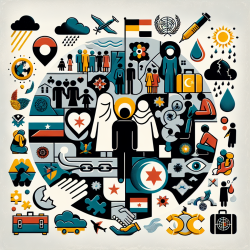The plight of the Yazidi refugees who have resettled in Canada after surviving the Daesh genocide is a stark reminder of the complex challenges faced by survivors of extreme violence. The research article "Sociodemographic Characteristics and Mental and Physical Health Diagnoses of Yazidi Refugees Who Survived the Daesh Genocide and Resettled in Canada" sheds light on these challenges and offers valuable insights for practitioners working with this vulnerable population.
The Context: Yazidi Refugees' Journey
The Yazidis, an ethnoreligious minority from northern Iraq, have endured decades of persecution, culminating in a targeted genocide by Daesh in 2014. This resulted in mass displacement, executions, and systemic violence. Between 2017 and 2018, Canada resettled approximately 1,500 Yazidi refugees, primarily women and children, through its Survivors of Daesh program. These individuals arrived with acute trauma and complex health issues that required specialized care.
Key Findings from the Research
The study conducted a comprehensive assessment of 242 Yazidi refugees who received care at a Canadian refugee clinic. Key findings include:
- High Trauma Exposure: Over half (51.2%) had direct exposure to Daesh captivity or violence.
- Family Separations: Nearly all families (95.2%) experienced separations post-resettlement.
- Complex Health Conditions: Common diagnoses included abdominal pain, iron deficiency, anemia, PTSD, and suspected somatoform disorders.
- Mental Health Challenges: Mental health conditions were prevalent, especially among women who experienced a threefold higher prevalence compared to men.
Implications for Practitioners
The findings underscore the need for practitioners to adopt a holistic approach when working with Yazidi refugees. Here are some strategies to consider:
- Trauma-Informed Care: Understand that many symptoms may be manifestations of psychological trauma. Providing a safe environment where patients feel comfortable sharing their experiences is crucial.
- Cultural Sensitivity: Recognize cultural nuances that influence how trauma is perceived and expressed. This understanding can prevent misdiagnoses and improve treatment effectiveness.
- Comprehensive Health Assessments: Conduct thorough assessments that consider both mental and physical health needs. Early identification of conditions like PTSD can lead to timely interventions.
- Family Reunification Support: Advocate for policies that prioritize family reunification as it plays a critical role in the healing process for refugees.
The Path Forward: Encouraging Further Research
This study highlights gaps in our understanding of the long-term health impacts on Yazidi refugees. Practitioners are encouraged to engage in further research to explore these areas:
- Longitudinal Studies: Investigate how health conditions evolve over time post-resettlement.
- Mental Health Screening Protocols: Develop standardized screening tools tailored to the unique experiences of genocide survivors.
- Cultural Competency Training: Explore training programs that enhance practitioners' ability to provide culturally sensitive care.
The journey towards healing for Yazidi refugees is complex and multifaceted. By integrating research findings into practice, practitioners can play a pivotal role in supporting these survivors on their path to recovery.
To read the original research paper, please follow this link: Sociodemographic Characteristics and Mental and Physical Health Diagnoses of Yazidi Refugees Who Survived the Daesh Genocide and Resettled in Canada.










